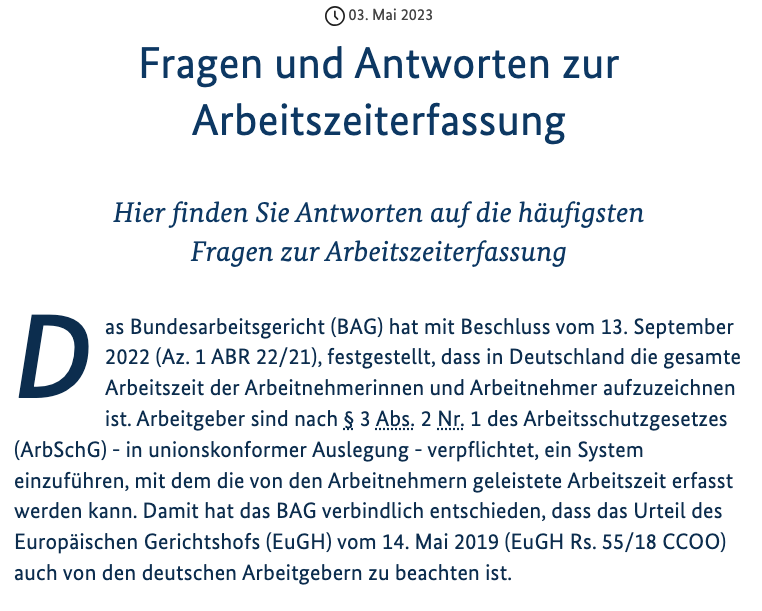Working time is an occupational safety issue!
The Working Hours Act (AZG) is a protective law, i.e. a building block of occupational health and safety. And this AZG regulates the time limits within which employers may deploy their employees.
The German occupational health and safety system is characterized by a dual structure. It consists of state occupational health and safety (federal and state governments) and the self-governing accident insurance institutions.
The government (federal and state) issues laws, ordinances and rules of state committees.

Inspection by the trade supervisory office in the event of anomalies
The federal states and their labor inspectorates monitor compliance with technical, medical and social occupational health and safety regulations and technical safety.
In my experience, the GAA checks at least three key topics during a visit, namely
- Time recording
- Risk assessment for maternity protection
- Risk assessment of psychological impairment at the workplace or in the working environment.
In order to avoid an official requirement with a deadline, I recommend proactively addressing the issue of time recording.
In my experience, many customers - at least in the Munich area - are considering switching to or additionally using PERSONIO's time recording system.
https://www.personio.de/funktionen/arbeitszeiterfassung/
The ArbZG was last amended in December 2020.
One of the most important changes is the obligation for employers to document the working hours of their employees.
This regulation should help employees to better enforce their rights to comply with working time regulations.
The working time documentation must be kept for at least two years.
Another important change concerns the working time limits:
- The working day may not exceed eight hours and may be extended to up to ten hours if the average working day does not exceed eight hours within six calendar months or within 24 weeks.
- The rest breaks must be at least 30 minutes if the working time is between six and nine hours and 45 minutes if the working time is more than nine hours.
- Employees are entitled to an uninterrupted rest period of at least eleven hours between two working days.
The working time regulations do not apply to all employees. Exemptions include senior executives, family members who work in the company and people who work in agriculture.
Legal certainty through working time recording
If you are unsure about the legal situation, please refer to the explanations below from the Federal Ministry of Labor and Social Affairs.

Be sure to clarify whether your company has any legal weaknesses in the recording of working time.
The federal states and their labor inspectorates monitor compliance with technical, medical and social occupational health and safety regulations and technical safety.
In my experience, the GAA checks at least three key topics during a visit, namely
- Time recording
- Risk assessment for maternity protection
- Risk assessment of psychological impairment at the workplace or in the working environment.
In order to avoid an official requirement with a deadline, I recommend proactively addressing the issue of time recording.


